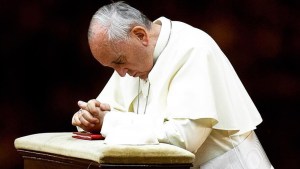“Follow your heart” could be helpful advice if the heart actually knew where it was going. In Saint-Exupéry’sThe Little Prince, the wise fox shared with the little prince a secret for navigating life: “It is only with the heart that one can see rightly, what is essential is invisible to the eye.” At the same time, a poignant message that the children’s classic drives home is that the heart requires a lot of taming and fine tuning before it can see clearly.
Depending on the culture and context, “heart” can refer to the physical organ, mind, feelings, desires, soul, conscience — or all of the above. The Bible uses “heart” to connote a combination of these concepts.
I describe “heart” as the spirit detector that God has installed in each of us — in our interior house. The heart lets us know whether the good or evil spirit has become a guest in our interior house. Like a smoke detector, the heart is quiet when our soul is safe, and sounds the alarm when our soul is in danger. It remains tranquil when God’s holy fire is burning. Any other fire would set the detector off. The heart lets us know whether to stay on course or make adjustments.
As with a smoke detector that needs to be checked, cleaned, and fine tuned regularly so that it could maintain its sensitivity to the presence of unholy smoke, the spirit detector also needs a regular checkup. Otherwise, it would have trouble distinguishing between friend and foe, substance and superficiality. Following a heart that cannot tell the difference or doesn’t care to tell the difference could leave us stranded in a burning house. For this reason, an apparently quiet detector might not always indicate that all is well. It could also mean that it’s filled with dust and grime or is out of battery and requires attention.
Commenting on 1 John 4:1, “[D]o not believe every spirit, but test the spirits to see whether they are from God,” Pope Francis in a homily stated: “Many Christians have their hearts like a road, and they don’t know who’s coming and who’s going, what’s coming and what’s going.” Indeed, the heart is not meant to be an open road for any spirit to pass through, but rather a safeguard against forces that seek our destruction.
St. Ignatius of Loyola learned through experience and with the guidance of the Holy Spirit to fine tune this spirit detector. He noticed that when the good spirit is present, there is “consolation,” or an increase in faith, hope, and love. And when the evil spirit is present, there is “desolation,” or increase in anxiety, agitation, and disturbances.
But these distinctions are not always clear since, as St. Ignatius noted, the evil spirit often comes “under the appearance of an angel of light” (Spiritual Exercises). Only a fine-tuned heart can distinguish true light from flashy lights, tears of repentance from tears of despair, holy flames from deadly fire.
How does this “fine tuning” of the heart occur? Before his conversion, when St. Ignatius was recovering from a battlefield, cannonball injury to his leg, he wanted to read his favorite romances that usually depicted glory-seeking knights fighting to win the hands of noble women. That was like fantasizing about becoming a YouTube star or making a viral TikTok video for a lot of “likes.” But since those books were not available to St. Ignatius where he was convalescing, he was given a book on the life of Christ and a collection of the lives of the saints.
He noticed that the apparent joy and excitement that these books gave him remained in him long after he put them down. He reflected: “How would it be, if I did this which St Francis did, and this which St Dominic did?” (Autobiography). In contrast, the short-lived excitement — the false light — that the thoughts of worldly pursuits put in him often left him feeling empty.
As spiritual reading began to renew his imagination, his heart began to wake up. The spirit detector was able to make itself heard again. Exposure to models of holiness helped the heart rediscover its direction and purpose. Reflecting on his past, he noticed that perverse and worldly thoughts “held his heart in such deep possession that he was subsequently absorbed in thought about it for two and three and four hours without noticing it” (Autobiography).
After his initial conversion, he sought out spiritual directors, deepened his prayer life, and continued to develop a keen sensitivity for the detection of spiritual movements and stirrings within him. This allowed him to know better whether his choices moved him closer to or further away from God.
Drawing from St. Ignatius’ example, below are some recommendations for fine tuning the heart — the spirit detector — regularly:
- Pray to the Holy Spirit often for light. “A clean heart create for me, God; renew within me a steadfast spirit” (Psalm 51: 12).
- Read the Scriptures, especially the Gospels, daily.
- Saints, saints, and more saints! Learn about the saint of the day. Watch a movie about a saint or other virtuous characters regularly (e.g., A Hidden Life). Speak with others about what you learned. Post daily quotes and pictures of holy people on social media.
- Consult with spiritual directors and models of holiness in your life.

Read more:
Pope Francis’ 8-step guide to discernment

